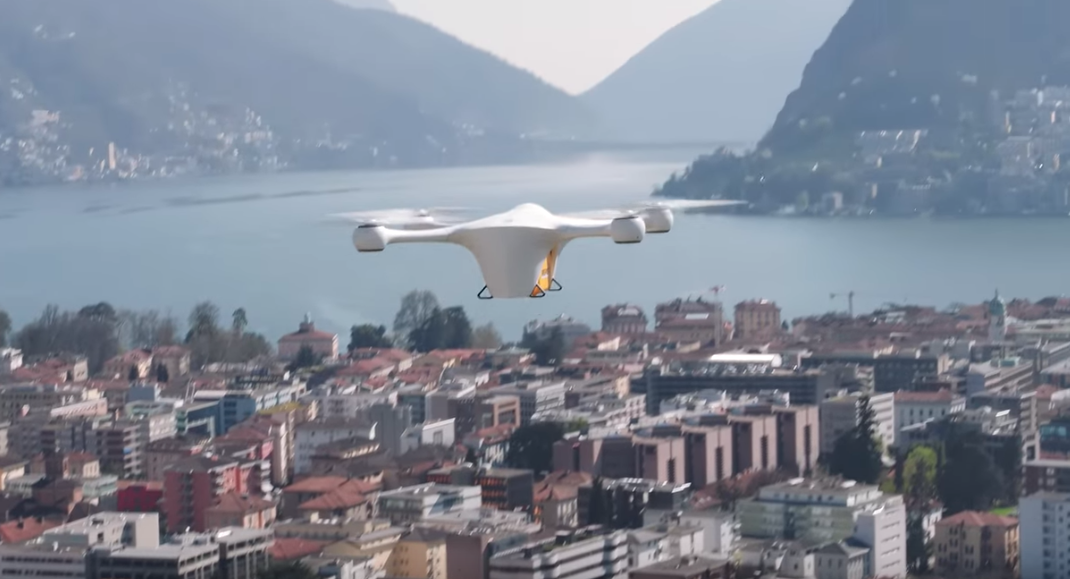Drone delivery service grounded after crash close to playing children
A drone delivery service ferrying lab samples between hospitals in Switzerland has been grounded, after a drone crashed into woodland, close to where children were playing, when its emergency parachute failed.
The unmanned flying vehicle was part of a collaboration between California-based drone maker Matternet and Switzerland courier service Swiss Post, and was used to carry lab samples between hospitals. The service was a far faster and more efficient option than traveling by road, had been active in three Swiss cities since mid-2018, and completed over 3,000 successful flights.
Read More:
- UPS seeks clearance for Flight Forward drone delivery service
- Amazon drone delivery service to begin 'in a matter of months'
- Google sibling Wing gets US approval to start drone delivery service this year
The drone crashed into the forest floor about 50 meters from where a group of pre-school children were playing, according to a report filed by the Swiss Safety Investigation Board.
The crash occurred when the drone activated its automatic emergency parachute system, which snagged on a sharp component of the drone, and detached, as reported by IEEE Spectrum, With its rotors no longer spinning and no parachute to slow its descent, the drone plummeted to the ground.
Drone deliveries grow
The crash and subsequent grounding come as numerous companies look to make commercial drone deliveries a reality. Amazon and UPS want to deliver parcels by drone, while UberEats and Domino's want to deliver food via unmanned flying vehicles.
Much larger that conventional drones from a company like DJI, these delivery drones from Matternet are designed to carry up to 4.4 pounds (2 kg) of payloads, and have a total weight of up to 22 pounds (10 kg). As such, they have the potential to cause serious damage and injury if their flight systems fail.
Swiss Post published a statement this week, acknowledging the incident and saying the service has been grounded until changes are made to how the drones fly. Swiss Post says it will establish a board of experts to "scrutinize all processes related to risk and safety management."
Clearly not afraid of showing its frustration with the Matternet-built drone, Swiss Post said: "It is not acceptable to Swiss Post that the safety measures have not worked. Swiss Post expects the manufacturer of the drones to ensure that safety mechanisms such as the parachute work properly."
This was the second crash for one of Swiss Post's lab delivery drones this year. In January, a drone suffered a system failure while flying over Lake Zurich, and did what it was supposed to do. In that case, the motors stopped, the parachute deployed, and the drone fell slowly to the lake, with lights flashing and an alarm blaring to alert anyone nearby.
After this crash, Matternet updated the drones and gave them a fully redundant GPS and compass with their own power system. Deliveries resumed soon after.
Naturally, while this was considered a textbook emergency landing, the second crash was a much more serious affair, as there was no parachute to slow the drone, and it struck the ground close to a children's play area.
Swiss Post has asked Matternet to introduce new safety features to its drones before the delivery service can be resumed. These are:
- Reinforce the parachute ropes with metal braiding
- Attach the parachute to the drone with two ropes instead of one
- Make the shrill whistle, activated during an emergency landing, louder
Matternet said in a statement sent to IEEE Spectrum: "This is the first time we had a failure on the vehicle's parachute system...the flight termination system was triggered nominally per the drone's specification, but the parachute cord was severed during the parachute deployment. We have never seen a failure like that in the past, neither in our expansive testing nor in commercial operations."
The drone maker added: "At Matternet we take the safety of our technology and operations extremely seriously. A failure of the parachute system is a clear failure of our safety mechanisms and we are taking all the appropriate measures to address it."
Seemingly suggesting that high winds could have caused the second crash, Swiss Post also says it will alter the parameters for what are deemed as safe flying conditions. The limit for constant wind will be reduced from just under 18 mph (8 m/s) to about 13.4 mph (6 m/s), the wind gust limit will be powered from just under 27 mph (12 m/s) to just over 22 mph (10 m/s), and the maximum flying speed for the drones will be reduced from just under 45 mph (20 m/s) to 38 mph (17 m/s or around 61.2 km/h).
The new limits are 20 percent lower than what is allowed by the Federal Office of Civil Aviation.
Although recognizing that "drones are a relatively young technology," Swiss Post says it will continue to invest in drone delivery services. The company added: "Drones can make an important contribution to efficient healthcare. The advantages have been proved during operations: drones can transport urgently required consignments more quickly, efficiently and ecologically than a courier travelling by road."
